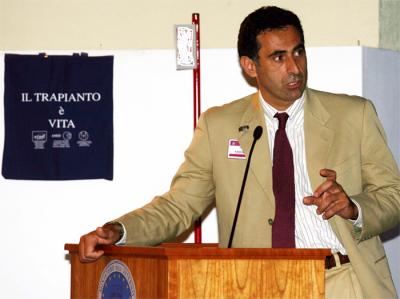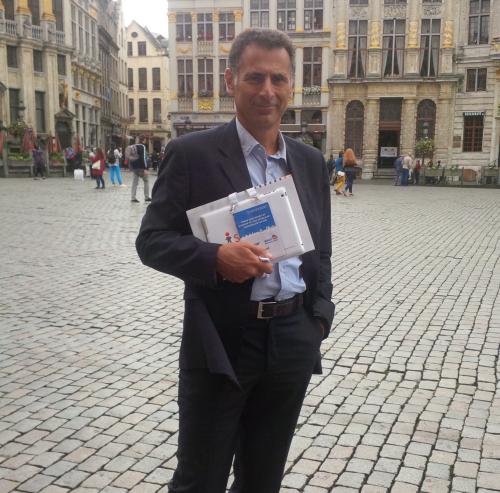Interview: Pioneering pancreas surgeon Massimo Iappelli

ROME: Interview with Prof. Massimo Iappelli, Director of the Operative Unit “Surgery uremic patient, Kidney and pancreas transplantation”, San Camillo Forlanini hospital, Rome. We have the pleasure to publish an interview to Prof. Massimo Iappelli, one of the most expert and popular kidney, pancreas transplant and cancer and other abdominal surgeons in Europe. He operates in the Operative Unit surgery for “uremic patient, kidney and pancreas transplantation” at the Hospital San Camillo Forlanini and gives us some important indications on diseases and on the Italian Health System.
Q: Prof. Iappelli, could you tell us when a Pancreas disease may lead to the need of a transplant ?
A: In simple words, the pancreas makes a substance called insulin. Insulin moves glucose, a sugar, from the blood into the muscles, fat, and liver cells, where it can be used as fuel.
In people with type 1 diabetes, the pancreas does not make enough, or sometimes any insulin. This causes glucose to build up in the blood, leading to a high level of sugar in the blood. High blood sugar over a long time can cause many complications, including:
· Amputations
· Disease of the arteries
· Blindness
· Heart disease
· Kidney damage
· Nerve damage
· Stroke
A pancreas transplant can cure diabetes and eliminate the need for insulin shots. Because of the difficulty of this surgery, most people with type 1 diabetes do not have a pancreas transplant just after they are diagnosed.
The healthy pancreas is taken from a donor who is brain dead, but is still on life support. The donor pancreas must be carefully matched to the person who is receiving it. The healthy pancreas is transported in a cooled solution that preserves the organ for up to about 12 hours.
The person's diseased pancreas is not removed during the operation. The donor pancreas is usually placed in the right lower part of the person's abdomen. Blood vessels from the new pancreas are attached to the person's blood vessels. The donor duodenum (first part of the small intestine right after the stomach) is attached to the person's intestine or bladder.
Q.: How long is the surgery?
A: The surgery for a pancreas transplant including explant and implantation takes about 15-18 hours. This operation is often done at the same time as a kidney transplant in diabetic people with kidney disease.
Q: What should a person do to enter in your “excellence center”?
A: Once a person arrives at our Operative Unit at Hospital San Camillo Forlanini, we evaluate his/her situation. The patient will have several visits. If the individual is deemed to be good candidate for a pancreas and kidney transplant, he/she will be put on a national waiting list. The place on a waiting list is based on a number of factors.
Q: How long is the wait?
A: The average wait for a pancreas from a deceased donor is between six months and two years. The wait for a pancreas transplant varies depending on a number of factors, such as severity of the illness and availability of a well-matched organ. In most cases, the pancreas comes from someone who has died (deceased donor).
Q: How successful are pancreas transplants?
A: If the transplant is successful, the individual will no longer need to take insulin shots, test blood-sugar daily, or follow a diabetes diet.
More than 95 percent of people survive the first year after a pancreas transplant. Organ rejection occurs in about 1 percent of people each year.
Individuals must take medicines that prevent rejection of the donated pancreas and kidney for the rest of your life.
The success of your pancreas transplant depends on many factors, including how well the patient follows the transplant team’s instructions, especially regarding taking medications, and how well the transplant matches person’s tissue. One year after the operation, 90% percent of pancreas recipients have a well-functioning transplant and 75% percent have a well-functioning transplant after five years. If you are in optimal health for your transplant, your chances for a successful outcome are as high as 90%.
Q: In most countries the estimated cost for the first year of a pancreas-only transplant averages $125,800. This includes the cost of the evaluation, procedures to obtain the donated organ, hospital charges, physician fees, follow-up care and anti-rejection medications. After the first year, the average annual cost of follow-up care is about $6,900. Accordingly, most patients need to seek advice of a financial counsellor or social worker to help the family to learn about funding sources for the costs of the transplant and after-care. What is the situation in Italy?
A: As you may know, Italy is one the of the best countries in the world for treatments related to transplants and surgeries in general. The Italian National Health System, thanks to taxpayers’s income tax payments made to the Italian State, sustains all the costs of each transplant with no charge for the patient on individual basis. The surgery is allowed only in a selected number of the so called “Centres of Excellence” to grant the quality of the full assistance avoiding any speculation on human organs.
Q: Is it correct saying that also other European citizens having access to the assistance of the Italian National Health System do not pay for a transplant?
A: Yes, correct. All the individuals having right to use the Italian Health System are taken care for transplant for free. I had a working experience in the USA and I understand how much heavy may be for families sustaining all the costs of a transplantation and related follow ups. Given the importance of transplant, Italy grants it for free.
For other “less invasive” surgeries such as cancer and other diseases surgeries, on the contrary, it is possible to have access to the so called “intramoenia” system which is a personalized and tailored assistance made at the center of excellence at hospital by using individual international health insurances to pay visits and hospital stay in private single rooms. The intramoenia should be better known by all the individuals living in Europe as it grants the patient with all the best equipment and medical assistance granted by the Hospital Excellence Center jointly with the comfort of a private clinic hospitalized assistance.
Q: What should a patient expect after the transplant?
A: Because the pancreas is a complex organ, a patient is admitted to the intensive care unit following the transplant for carefully monitoring blood sugars. Most patients are discharged within seven to 14 days if the post-operative course has been smooth and there is no sign of infection or rejection. A patient will need to take specific medicines called immunosuppressive or anti-rejection medications, following transplant surgery to help prevent body from rejecting the newly transplanted organ. In addition, the individual will have regularly scheduled tests as an outpatient to monitor the function of the transplanted organ and will be encouraged to maintain a healthy lifestyle through diet and exercise. He/she will no longer need to take insulin shots. They feel to be free. In addition, research studies show that good functioning of the new pancreas may help to stabilize the progression of some of the long-term complications of diabetes such as diabetic eye disease leading to blindness and nerve damage.
Q: Prof. Iappelli, would it be possible to meet you again to talk on transplants between alive people and on other abdominal surgeries?
A: Yes, of course. It is very important to inform citizens about the importance of prevention, transplant possibilities, cancer and other surgeries such as for polycystic kidney diseases.
Contacts:
PROF. MASSIMO IAPPELLI
DIRETTORE U.O. S. PAZIENTE UREMICO TRAPIANTO RENE PANCREAS
SAN CAMILLO FORLANINI ROMA
TEL. 06.86761914



